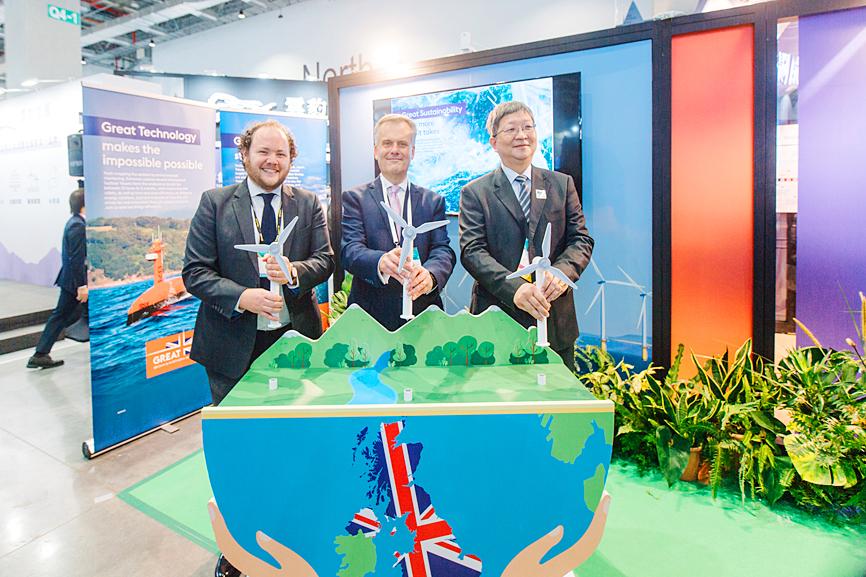Taiwan’s solar and wind energy installations would generate revenue of more than NT$2 trillion (US$72.09 billion) and create 160,000 jobs by 2025, President Tsai Ing-wen (蔡英文) said yesterday, reiterating the nation’s resolve to energy transition.
Tsai made the remarks at the opening of the three-day Energy Taiwan exposition at the Nangang Exhibition Center’s Hall 2 in Taipei.
Exports of Taiwan’s semiconductor manufacturing facilities in the third quarter exceeded US$7.3 billion, making it the biggest market in the world, Tsai said, citing Semiconductor Equipment and Materials International data.

Photo courtesy of the British Office Taipei
The booming semiconductor industry is increasing demand for green power, while the government is committed to expanding the green energy industry, she said.
By 2025, the nation’s wind and solar power installations would create investments of up to NT$1.7 trillion, revenue of more than NT$2 trillion and 160,000 jobs, Tsai said.
“The UK is supporting Taiwan in its energy transition,” British Representative to Taiwan John Dennis said at the British pavilion later. “We are partnering with Taiwan to turbocharge its offshore wind sector and become the regional leader in clean growth.”
“Now, Taiwan is the UK’s largest offshore wind market in Asia-Pacific,” Dennis said. “I would like to congratulate the Bureau of Energy and the Ministry of Economic Affairs on their third round offshore wind development plan, and their target to achieve 20.5 gigawatts in capacity by 2035.”
Taiwan, although it was not part of the COP26 negotiations, has an important role to play, as it is the world’s 21st-largest economy and a top-25 emitter of carbon dioxide, he said.
The envoy also welcomed Taiwan’s commitment to carbon neutrality by 2050 and its plan to legislate a carbon pricing scheme.
“The UK’s credit agency ... has provided more than £500 million [US$659.78 million] in credit guarantees to three offshore wind farms in Taiwan,” he said.
It is the first time that the British Office Taipei has had a UK-themed pavilion at the annual energy exposition, the office said.
There are more than 30 British offshore wind companies with offices in Taiwan, with eight — Aggreko International Projects, Correll Electrical Engineering Taiwan Branch, CWind Taiwan, Flotation Energy Taiwan, James Fisher Renewables, Offshore Wind Consultants Taiwan, Taiwan Mott MacDonald and Taylor Hopkinson — exhibiting, it said.
The companies are to demonstrate the breadth of British expertise, including offshore wind farm planning and construction, engineering consultancy, crew transfer vessels, operations and maintenance, blade services, floating wind technology, and temporary power and temperature solutions for offshore wind farms, it said.
Also at the exposition are a handful of German and Dutch companies, including RWE Renewables Taiwan, Phoenix Contact and Boskalis Hwachi Offshore Wind Taiwan.
The COVID-19 pandemic has hindered the progress of some offshore installations, but the situation is expected to improve from next year, German Offshore-Wind Initiative Taiwan representative David Chiang (蔣大巍) said.
Many energy developers are competing for the third phase of Taiwan’s offshore wind farm plan, after the ministry in July started accepting applications, he said.
Floating wind technology is expected to become a new trend, Chiang said, adding that the government should ensure the consistency of energy policy to minimize the risks for energy developers.

PREPAREDNESS: Given the difficulty of importing ammunition during wartime, the Ministry of National Defense said it would prioritize ‘coproduction’ partnerships A newly formed unit of the Marine Corps tasked with land-based security operations has recently replaced its aging, domestically produced rifles with more advanced, US-made M4A1 rifles, a source said yesterday. The unnamed source familiar with the matter said the First Security Battalion of the Marine Corps’ Air Defense and Base Guard Group has replaced its older T65K2 rifles, which have been in service since the late 1980s, with the newly received M4A1s. The source did not say exactly when the upgrade took place or how many M4A1s were issued to the battalion. The confirmation came after Chinese-language media reported

A Ministry of Foreign Affairs official yesterday said that a delegation that visited China for an APEC meeting did not receive any kind of treatment that downgraded Taiwan’s sovereignty. Department of International Organizations Director-General Jonathan Sun (孫儉元) said that he and a group of ministry officials visited Shenzhen, China, to attend the APEC Informal Senior Officials’ Meeting last month. The trip went “smoothly and safely” for all Taiwanese delegates, as the Chinese side arranged the trip in accordance with long-standing practices, Sun said at the ministry’s weekly briefing. The Taiwanese group did not encounter any political suppression, he said. Sun made the remarks when

The Taiwanese passport ranked 33rd in a global listing of passports by convenience this month, rising three places from last month’s ranking, but matching its position in January last year. The Henley Passport Index, an international ranking of passports by the number of designations its holder can travel to without a visa, showed that the Taiwan passport enables holders to travel to 139 countries and territories without a visa. Singapore’s passport was ranked the most powerful with visa-free access to 192 destinations out of 227, according to the index published on Tuesday by UK-based migration investment consultancy firm Henley and Partners. Japan’s and

BROAD AGREEMENT: The two are nearing a trade deal to reduce Taiwan’s tariff to 15% and a commitment for TSMC to build five more fabs, a ‘New York Times’ report said Taiwan and the US have reached a broad consensus on a trade deal, the Executive Yuan’s Office of Trade Negotiations said yesterday, after a report said that Washington is set to reduce Taiwan’s tariff rate to 15 percent. The New York Times on Monday reported that the two nations are nearing a trade deal to reduce Taiwan’s tariff rate to 15 percent and commit Taiwan Semiconductor Manufacturing Co (TSMC, 台積電) to building at least five more facilities in the US. “The agreement, which has been under negotiation for months, is being legally scrubbed and could be announced this month,” the paper said,